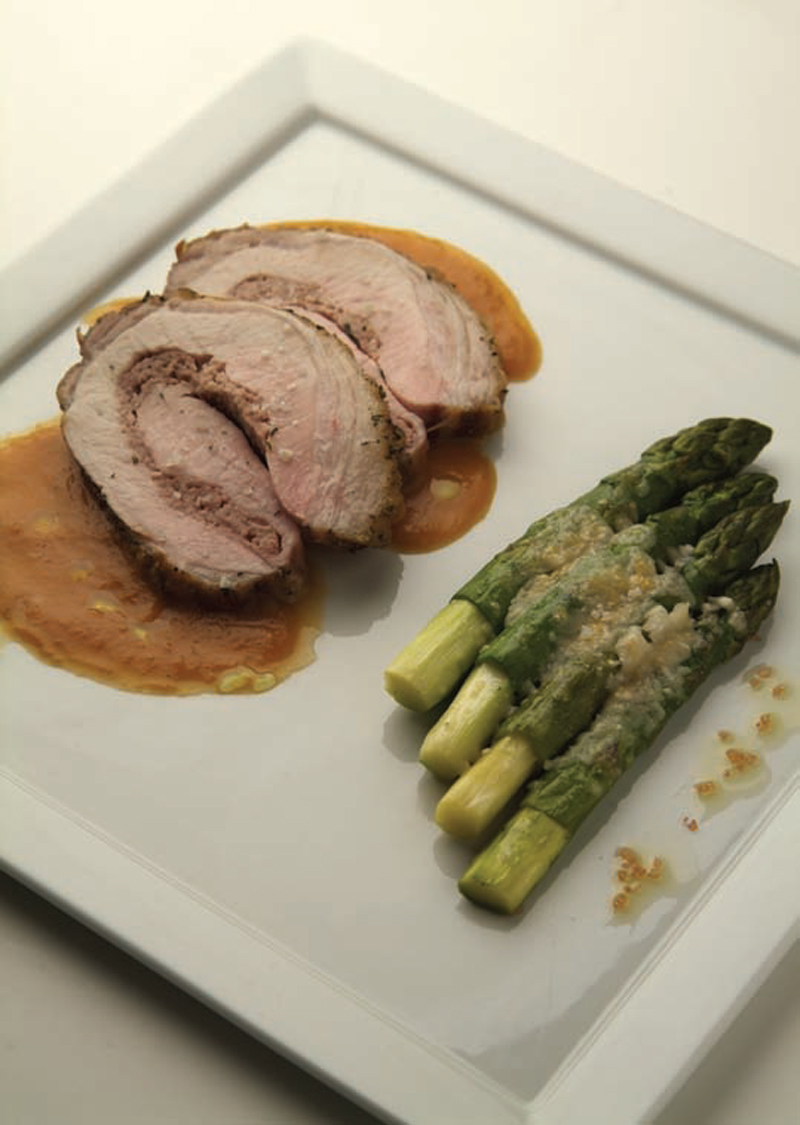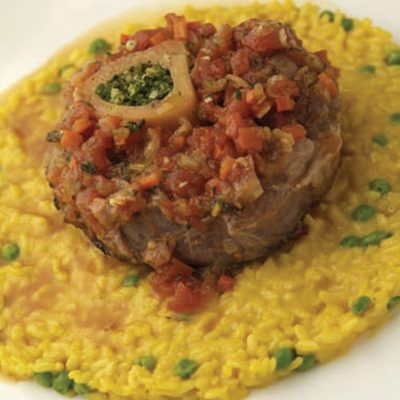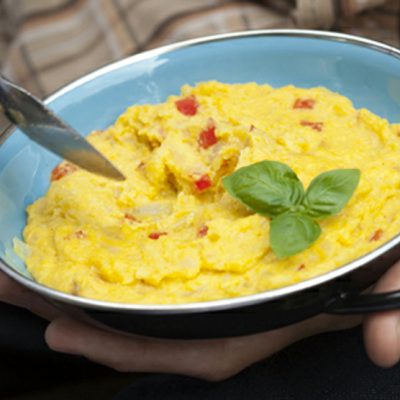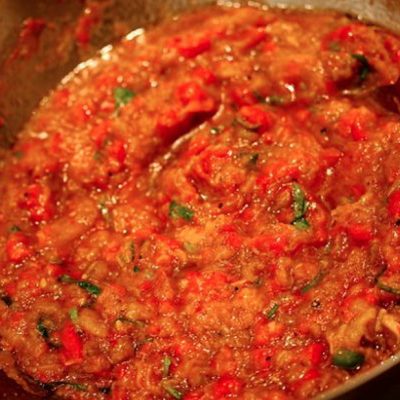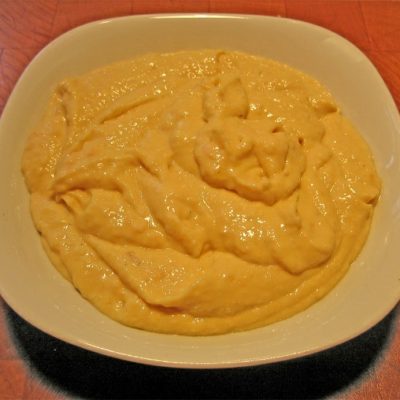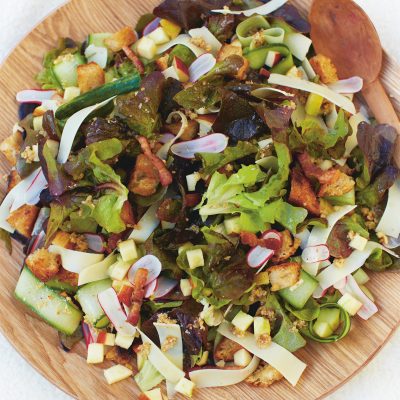Ingredients
-
For Making the Forcemeat
-
8 oz Veal
-
2 oz Prosciutto
-
3 oz Pancetta
-
2 oz Parmesan Cheese
-
1 Whole Egg
-
5 cloves Garlic
-
¼ tsp Salt
-
¼ tsp Black Pepper
-
6 oz Heavy Cream
-
For Stuffi ng and Tying the Roast
-
6–7 lb Boneless Pork
-
Salt
-
Black Pepper
-
Forcemeat
-
Butcher’s Twine
-
For Roasting the Pork Loin
-
Stuffed Loin
-
2 oz Olive Oil
-
1 Tbsp Fresh Rosemary
-
Salt
-
Black Pepper
-
For Roasting Vegetables for the Sauce
-
1 lb Yellow Onion
-
1.5 lbs Tomatoes
-
1 oz Garlic
-
2 oz Extra Virgin Olive Oil
-
1 tsp Fresh Rosemary
-
1/8 tsp Salt
-
Foil
-
For Making the Pan Sauce
-
6 oz Dry White Wine
-
3 cups Beef Broth
-
Roasted Vegetables
-
2 oz Beef
-
1.5 oz Extra Virgin Olive Oil
-
Salt
-
Freshly Ground Black Pepper
Directions
Tuscany is well known for the roast porks that are commonly found in restaurants and homes. This recipe is an example of the utilization of Italian products to make an excellent stuffed pork loin that also presents very well.
Steps
|
1
Done
|
For Making the Forcemeat FillingPlace the ground veal, prosciutto, pancetta, Parmesan cheese, egg, garlic, salt, and pepper in a food processor. With the processor running, slowly add the cream to make a thick emulsion. |
|
2
Done
|
Transfer the forcemeat to a chilled container, and place in the refrigerator until the pork loin has been fabricated and is ready to be stuffed. |
|
3
Done
|
For Stuffi ng and Tying the Pork LoinFabricate the whole boneless pork loin by laying it on a cutting board with the fat side facing up. |
|
4
Done
|
Make a cut the length of the pork loin on the clean meat side the part of the loin that was against the chin bone of the bone-in loin (consult your instructor or text if you are not sure what part of the loin this is), approximately ¾ of an inch or an inch above the cutting board. |
|
5
Done
|
Continue to cut horizontally into the loin, keeping the portion of the loin under the knife approximately ¾ inch thick until you are approximately ¾ of an inch to an inch from the other side of the loin (this entire cut will be about 3 to 4 inches in length along the entire length of the loin). |
|
6
Done
|
Once this cut is completed, lay out the remaining part of the loin and do the same thing: cut approximately ¾ of an inch horizontally above the cutting board, along the length of the loin. This will yield a wider “sheet” of the loin. |
|
7
Done
|
Continue cutting until the entire loin is ¾ inch thick and opened like a sheet. |
|
8
Done
|
Once the loin is fabricated in this manner, season the exposed portion of the loin with salt and pepper, and then spread the forcemeat evenly over the surface of the loin, leaving a inch or so of space on the ends of the loin. |
|
9
Done
|
Once the forcemeat has been spread over the loin, roll the loin tightly in the opposite direction from which it was fabricated to return it to the shape and look of the original loin (it will be a little larger from being stuffed, but otherwise it will look the same). |
|
10
Done
|
Once the loin has been rolled, secure the loin by trussing with butcher’s twine, tying every 1 to 2 inches along the length of the loin to ensure that the stuffing remains inside and the loin retains its shape during cooking. |
|
11
Done
|
For Roasting the LoinPreheat the oven to 400 degree F. |
|
12
Done
|
Place the loin in a large roasting pan (the loin can be cut in half if it is too large for your roasting pan), and rub the outside of the loin with the olive oil before seasoning it with the rosemary, salt, and pepper. |
|
13
Done
|
Place the stuffed loin in the preheated oven and roast for 20 minutes, or until the exterior turns golden brown. |
|
14
Done
|
Once the exterior is golden brown, turn the oven down to 300 degree F and finish cooking at the lower temperature until the interior temperature of the loin reaches 145 degree F; this will take approximately 30 to 35 minutes more, depending on the size of the loin (be sure to move the thermometer back and forth once the temperature settles to ensure that the reading is accurate if the temperature drops, you were not in the coolest part of the meat and need to allow the temperature to settle again). |
|
15
Done
|
Once the loin reaches this temperature, remove it from the oven and place it on a cutting board for carving. C it with foil and allow it to sit for 15 minutes before carving for service. |
|
16
Done
|
For Roasting Vegetables for the SaucePreheat the oven to 325 degree F. |
|
17
Done
|
Combine the quartered onions, peeled tomatoes, garlic cloves, olive oil, rosemary, and salt in a mixing bowl, and mix well to coat all of the vegetables with the oil. |
|
18
Done
|
Once the ingredients have been mixed, transfer them to a large piece of aluminum foil and wrap them, bringing the open part of the foil together above the vegetables. Place foil-wrapped vegetables on a sheet pan and place in the preheated oven. |
|
19
Done
|
Roast in the oven for 1 hour or until the vegetables are very soft, and then remove them from the oven and set aside to cool. |
|
20
Done
|
Once the vegetables have cooled enough to handle, place them in a blender and purée until smooth. Add water, if necessary, to achieve smooth consistency. |
|
21
Done
|
For Making the Pan SauceIn a large sauté pan, combine the white wine, beef stock, and puréed and roasted vegetables, and place over a medium flame to bring mixture to a simmer. |
|
22
Done
|
Once the mixture comes to a simmer, add the glaze and, if necessary, reduce until the mixture becomes thick enough to coat the back of a spoon. |
|
23
Done
|
Once consistency is achieved, swirl in the extra virgin olive oil to the gently simmering sauce to form a smoother sauce. |
|
24
Done
|
Season the sauce with salt and pepper, if necessary, and serve under the slices of the loin. |

